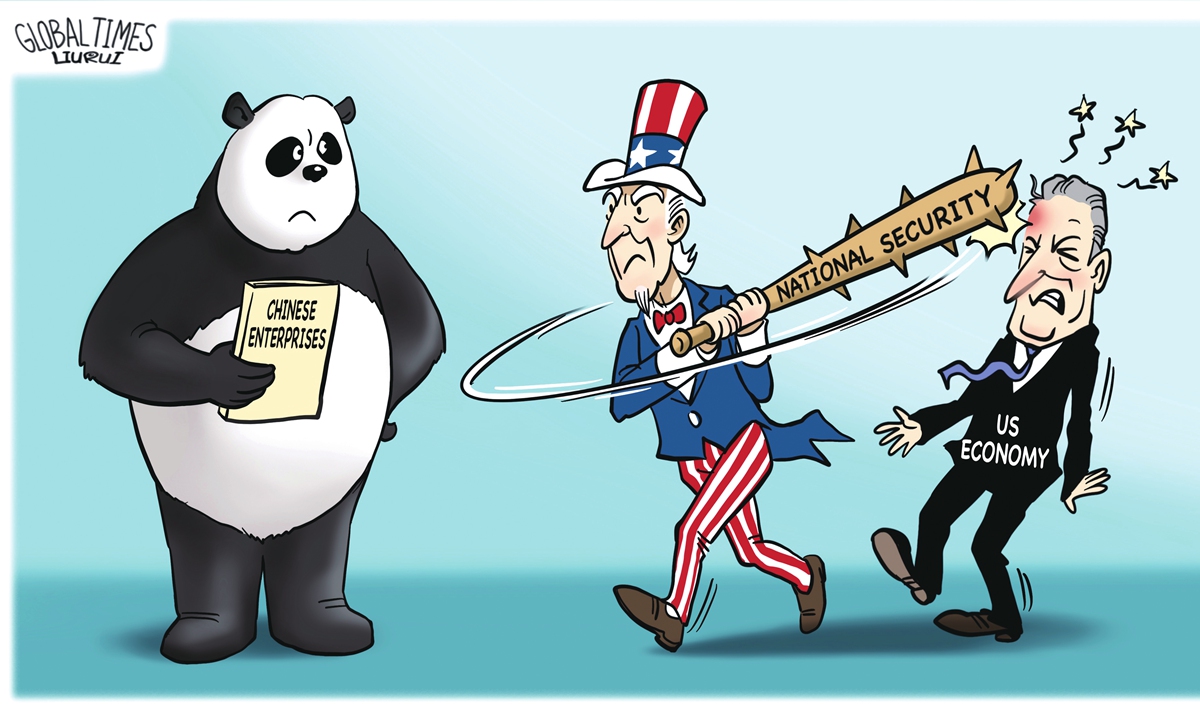
Illustration: Liu Rui/GT
More than half a year ago, Brandon Bochenski, Republican mayor of Grand Forks, a city in North Dakota, asked "Are we going to be the first one to basically say no to globalism?" His question came after a Chinese company's plan to build a local corn mill unexpectedly caused controversies. As a firm supporter of that project, Bochenski called the opposition voices "a large push away from globalization."
But just two days ago, Bochenski himself said he would seek the City Council's help to block construction by trying to deny building permits and by refusing to connect city infrastructure to the building site. North Dakota's Republican governor, Doug Burgum, who celebrated with Bochenski in late 2021 when Grand Forks landed the project, also changed his attitude. The US media claimed that the project hit "what appears to be an insurmountable hurdle." The question Bochenski asked half a year ago has become a reality. The answer given by reality is ironic, bitter and helpless, and it has become yet another practical action of the US to "say no to globalism."
Even the New York Times admitted that the project had been welcomed as an economic development success. So why did the dramatic reversal occur in just a few months? What is the force and emotion driving behind? The attitudes of people like Bochenski and Burgum have changed so much that it is not normal. While questioning these, we have made many discoveries worth deep thinking. They reflect the complete process of how Americans' pragmatic rationality toward China has been eroded, coerced, and slowly deteriorated, and even reveal the internal logic of why today's China-US relations have gone so distorted.
Although Grand Forks has the word "grand" in its name, it is actually very small, with a population of only 50,000 to 60,000, and the total population of North Dakota is less than 800,000. It is located in the Midwest of the US, with a cold climate and a relatively backward economy. According to Mayor Bochenski, 18 percent of the residents in Grand Forks live in poverty, far higher than the national average. Therefore, when the American branch of China Fufeng Group purchased land in the city and planned to build a corn milling plant, the mayor and governor who hoped to promote local economic development and employment opportunities were both very happy, considering it a "huge opportunity." No matter from which point of view, this is a mutually beneficial and win-win cooperation, and it fully complies with the market norms of the US.
However, the subsequent development of the matter surprised many US media. In a society with diverse interests, it is not surprising that some people do not support this project. What is strange is the reasons for their opposition and why this matter has caused such a big stir in the US. Initially some people said that the city's water supply was not enough to support the operation of the corn milling plant, and others complained about possible odors or traffic congestion (in a city of 50,000 to 60,000 people), etc. When these concerns were proved to be unnecessary, some people finally found a very lethal breakthrough -- the "China threat" theory, claiming that the proposed corn milling plant is not far from a US Air Force base, and might be used by "China to monitor the air base." Although this is obviously far-fetched and alarmist, but in the US, which is currently highly hostile to China, such a farce is performed publicly.
Anti-China politicians in Washington are obsessed with such a topic, and it soon caught the attention of the Congress with one Republican federal senator telling US Air Force general that "Maybe it's just a corn mill. But it would also provide the potential, at least, for Chinese intelligence to engage in intelligence collection of various kinds." These are typical unwarranted charges. Eventually, even the city had voluntarily shared information about its interactions with the Committee on Foreign Investment in the US and said it didn't view the proposed corn-milling activity as a national security concern, the US Air Force still sent a letter to the Grand Forks, claiming "The proposed project presents a significant threat to national security with both near- and long-term risks of significant impacts to our operations in the area," which dealt a fatal blow to the project. This is the result of selective blindness of blind anti-China politicians.
Throughout the whole incident, economic laws and market principles have been squeezed to the corner step by step by so called political and security concerns. A normal investment project has been sabotaged by abnormal means to the extent that the business environment of the US is as uncertain and unpredictable as a country in political turmoil and it doesn't look like a mature market. "National security" is like the sword of Damocles, hanging over the heads of all foreign companies in the US. This corn mill plant storm has not yet settled, and it should cause more Americans to reflect deeply.
At the same time, for those Chinese companies considering investing in the US, this incident is also a wake-up call. Even in a sparsely populated remote area like North Dakota, the so-called national security may destroy normal investment projects at any time.




